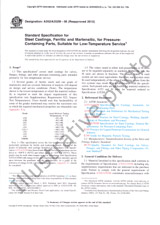We need your consent to use the individual data so that you can see information about your interests, among other things. Click "OK" to give your consent.
ASTM F2038-18
Standard Guide for Silicone Elastomers, Gels, and Foams Used in Medical Applications Part I´Formulations and Uncured Materials
Translate name
STANDARD published on 1.12.2018
The information about the standard:
Designation standards: ASTM F2038-18
Publication date standards: 1.12.2018
SKU: NS-936835
The number of pages: 5
Approximate weight : 15 g (0.03 lbs)
Country: American technical standard
Category: Technical standards ASTM
The category - similar standards:
Annotation of standard text ASTM F2038-18 :
Keywords:
elastomer, foam, gel, HCR, high consistency rubber, liquid silicone rubber, LSR, moisture cure, medical device material, peroxide cure, platinum cure, RTV,, ICS Number Code 11.040.40 (Implants for surgery, prothetics and orthotics)
Additional information
| Significance and Use | ||||||||
|
4.1 This guide is intended to provide guidance for the specification and selection of silicone materials for medical device applications. 4.2 Silicone manufacturers supplying materials to the medical device industry should readily provide information regarding non-proprietary product formulation to their customers either directly, or through the US FDA master file program. |
||||||||
| 1. Scope | ||||||||
|
1.1 This guide is intended to educate potential users of silicone elastomers, gels, and foams relative to their formulation and use. It does not provide information relative to silicone powders, fluids, or other silicones. The information provided is offered to guide users in the selection of appropriate materials, after consideration of the chemical, physical, and toxicological properties of individual ingredients or by-products. This guide offers general information about silicone materials typically used for medical applications. Detail on the crosslinking and fabrication of silicone materials is found in Part II of this guide. 1.2 Fabrication and properties of elastomers is covered in the companion document, F2042. This monograph addresses only components of uncured elastomers, gels, and foams. 1.3 Silicone biocompatibility issues can be addressed at several levels, but ultimately the device manufacturer must assess biological suitability relative to intended use. 1.4 Biological and physical properties tend to be more reproducible when materials are manufactured in accordance with accepted quality standards such as ISO 9001 and current FDA Quality System Regulations/Good Manufacturing Practice Regulations (21CFR, Parts 210, 211, and 820). 1.5 The values stated in SI units are to be regarded as standard. The values given in parentheses are mathematical conversions to inch-pound units that are provided for information only and are not considered standard. 1.6 This standard does not purport to address all of the safety concerns, if any, associated with its use. It is the responsibility of the user of this standard to establish appropriate safety, health, and environmental practices and determine the applicability of regulatory limitations prior to use. 1.7 This international standard was developed in accordance with internationally recognized principles on standardization established in the Decision on Principles for the Development of International Standards, Guides and Recommendations issued by the World Trade Organization Technical Barriers to Trade (TBT) Committee. |
||||||||
| 2. Referenced Documents | ||||||||
|
We recommend:
Technical standards updating
Do you want to make sure you use only the valid technical standards?
We can offer you a solution which will provide you a monthly overview concerning the updating of standards which you use.
Would you like to know more? Look at this page.




 Cookies
Cookies
